|
BSR was a household name in
the 1960s, 1970s and 1980s when vinyl records
were very popular and almost every household
possessed a gramophone. Tape recorders also
became popular in the 1960s, when many people
owned a BSR tape deck.
The business was started by
Daniel McDonald who was born in Fort William,
where his father ran the successful McDonald
Brothers grocery store. After attending Glasgow
University, Daniel McDonald got a job at B.T.H.
in Rugby, where he was involved in the design of
audio amplifiers for cinema projectors. He moved
to the West Midlands, when he was transferred to
the B.T.H. factory in Cakemore Road, Blackheath.
He soon became disillusioned with B.T.H. and left in
1930, determined to start his own business.
In Blackheath he lodged at
the home of Ben and Sadie Shephard in Highfield
Road and formed a relationship with their
daughter, Winifred, who worked in Oldbury Post
Office. They were later engaged and married in
1932. The Shephards also had a son, Percy, who
started working on small projects with Daniel,
such as audio amplifiers.
Daniel rented a small
workshop near his home, where bellows for local
nail manufacturers had been made. It was a brick
building with around 400 feet of floor space and so
was ideal for Daniel’s needs. He began making
audio amplifiers and radios, to order, and soon
got the contract to build a 120 watt public
address system for Blackburn greyhound stadium.
He also manufactured mains transformers and
audio output transformers and in January, 1932,
began to use the BSR name (Birmingham Sound
Reproducers). In May he took-on his
first employee, Nancy Rotham who looked after
the bookkeeping. In June, Percy Shephard left
his job as a toolmaker at Lench’s and joined
Daniel in the business.
In January 1933 the
business moved to part of a joinery yard in
Claremont Street, Old Hill, where there was a two
storey building with a floor area of 5,000
square feet. The first product made there was the
‘Ampligram’, a record player into which a
microphone could be plugged, so that it could
also be used as a public address system. Towards
the end of the year, BSR was also producing a
five valve radio and loudspeakers. In 1934 the
company launched the VS8 radiogram, followed in 1935 by
a range of audio amplifiers, turntables,
loudspeakers, microphones, mains transformers,
audio driver and output transformers and audio
signal generators.
|
|
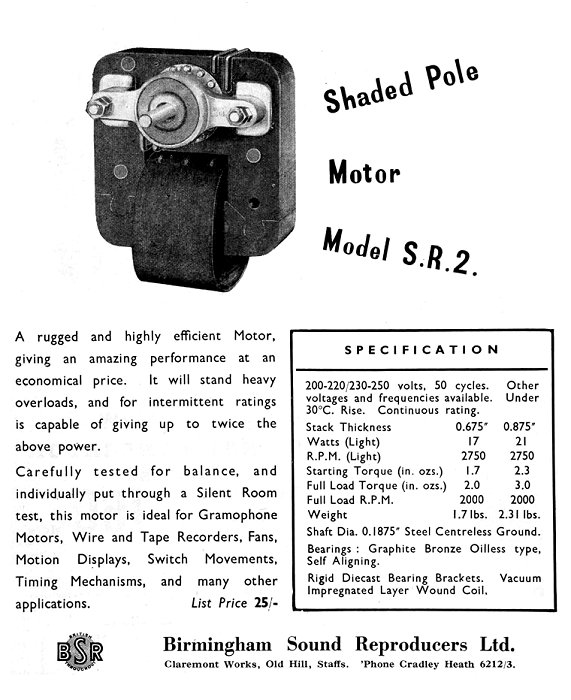
An advert from 1949. |
|
Product development
continued and more employees were taken on. An
audiometer to test people’s hearing was launched
in 1936 and in 1937 a cardio tachometer was
produced to diagnose heart disease. Around this
time, Daniel enrolled on a medical course at
Birmingham Medical School to increase his
medical knowledge.
During the Second World War
the company became involved in the design and
production of military equipment, including a
device to set off acoustic mines, an underwater
submarine detector and aerial trimmers for RAF
communication equipment. At the same time the
production of the BSR audio products continued
and the firm took-on a lot of extra staff. Some
of the government orders continued until the
early 1950s
In 1947, BSR developed a
shaded pole motor which would become an
essential component in future record and tape
decks. The firm also developed a portable disc
recording outfit, the DR66, the company’s first
venture into sound recording. BSR also operated
a portable recording studio, built into an
Austin van. Other new products at the end of the
1940s included the ‘Telemaster’ intercom set and
a loudspeaker and amplifier for use in police
cars.
In 1949 the company began
producing turntable units, initially for Decca,
but they soon appeared carrying the BSR name.
They were extremely successful and because of
the high volume of sales, the business had to
expand. The Board of Trade declined to let them
build a new factory in the West Midlands and so
alternative locations were examined. In the end
a new factory was built in Blighs Lane,
Londonderry.
|
|
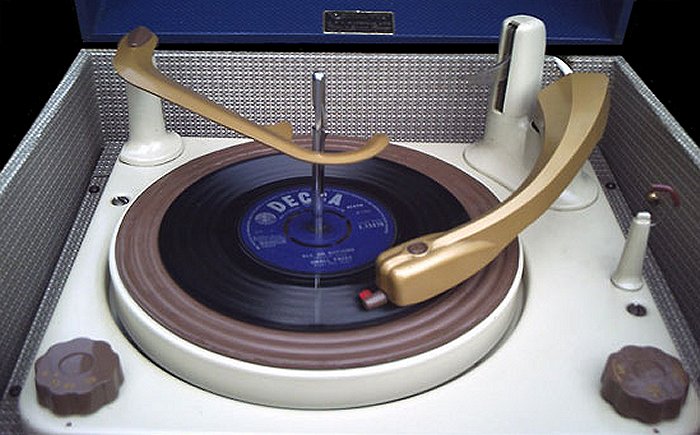
A BSR Monarch
autochanger. |
|
In 1951, a new single
storey building was added to the Claremont
Street site, to be used for the production of
record decks. At this time, BSR developed the
‘Monarch’ automatic record changer that could
handle seven inch, 10 inch, and 12 inch records
automatically in any order. One of the most
popular makes of portable record players at the
time was ‘Dansette’, many of which used BSR
turntables.
By 1953 the existing
factories at Old Hill and Londonderry were
working close to full capacity, so further
expansion was essential in order to keep up with
the growing demand. A new factory was opened at
Drumaho in Ireland, employing around 150 women
and girls. At the same time the Board of Trade
gave permission for the building of a new
factory in the Black Country and so land was
acquired in Powke Lane, Old Hill, where ‘Monarch
Works’ was built. The new factory opened in 1954
and machinery and around 120 members of staff
moved there from Claremont Street, along with
150 new employees. In the same year another
factory opened in Australia, employing around
120 people.
In 1959 BSR became a public
limited company, but all was not well with
production. It was discovered that a large
number of scrap products were piling up inside
the warehouses and so a shake-up of production
methods was essential. All of the offending
members in the management team were dismissed on
the spot, which had a devastating impact on the
workforce. Two hundred members of the workforce
of around one thousand were made redundant and
it took about six months to sort out the scrap
products and repair and save as much as
possible.
|
|
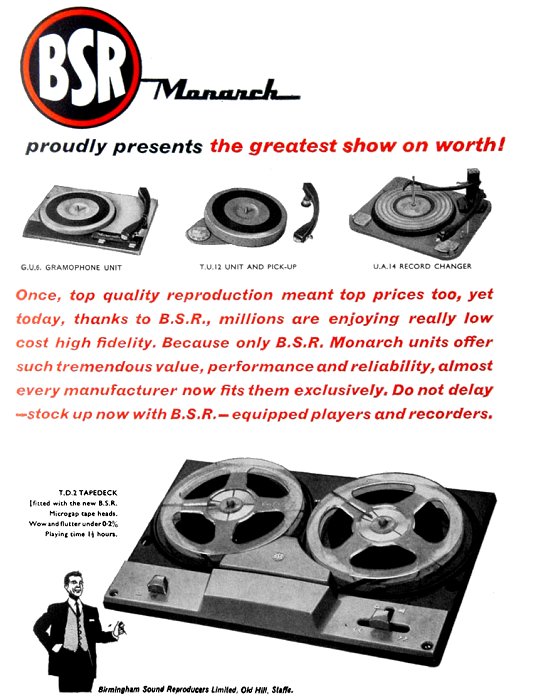
An advert from 1961. |
|
While this was happening,
orders still kept arriving, including five tons
of record changers for an American buyer. At
this time manufacturing centred on the
Londonderry factory.
Expansion continued with
the purchase of a piece of land at Wollaston,
Stourbridge, originally known as Wollaston Mill.
A 200,000 square feet factory was built on the
site to be used for the manufacture of
refrigerators and tape decks. The company
had also hoped to produce washing machines, but
both the washing machine and refrigerator plans
were cancelled.
In 1965 the company
launched the UA50 or ‘Minichanger’ portable
record player which was extremely successful.
Operations in Londonderry were blighted with
stoppages and walkouts by an increasingly
militant workforce, leading to a lot of
disruption to production. This couldn’t be
tolerated and so in February 1967 the factory
closed, putting the workforce of 2,000 out of a
job. Much of the machinery and production was
transferred to Old Hill, as were some of the
staff. Some production was transferred to a new
factory at East Kilbride that had opened on the
1st April, 1964.
Higher quality record
players soon followed including the UA70
launched in 1966. In 1969 industrial unrest was
causing problems at East Kilbride which
escalated into a strike lasting 16 weeks. The
McDonald family became disillusioned with such
problems and sold their shares, which raised
£16.25 million. John N. Ferguson took over as
Chairman and sales continued to grow. In 1971 BSR acquired Bulpitts Limited, manufacturers of
Swan Brand electric kettles and ran a
recruitment drive to attract more employees.
The site at Stourbridge was extended in 1972
when 1,000 new jobs were on offer. The firm also
launched an 8 track tape player called the TD8S.
New transcription quality
turntables were introduced and BSR acquired
Goblin Limited, makers of vacuum cleaners. BSR (Housewares) Limited was formed to oversee
the electric kettle and vacuum cleaner part of
the business. Although Daniel McDonald had left
the business, he reappeared when he opened a
company in Wollaston called ‘Glenburn’, that
manufactured high quality turntables in direct
opposition to BSR. Glenburn was very successful
and so BSR had no alternative but to attempt to
take over Glenburn. After lengthy discussions a
buy-out was agreed, which cost BSR £4 million.
|
|
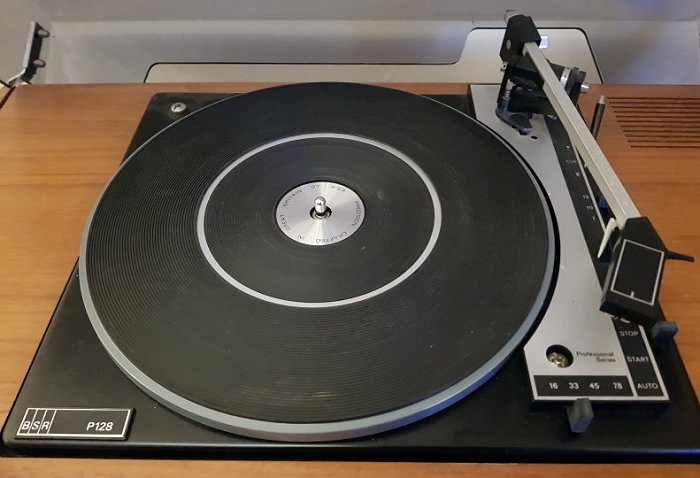
A BSR P128 turntable. |
|
In 1975, work began on a
new factory in Garratts Lane, Old Hill, covering
370,000 square feet. In March 1976 the company
launched its most innovative turntable, the ADC Accutrac with direct drive and electronic track
selection. Expansion continued in 1977 with the
acquisition of holloware manufacturer, Judge
International.
The last years
There was much industrial
unrest in 1978 and far eastern companies began
to take a great interest in British
manufacturing. The strengthening value of
the pound against the dollar had a great impact
because America was the company’s biggest
market, so less money was earned. The sale of
electronic goods from the far east had a great
impact, particularly on BSR’s sales to America,
which greatly reduced. As orders fell, short
time working was introduced, followed by a four
day week, a three day week and voluntary
redundancies. In June 1980 the company was
forced to announce a further 2,300 redundancies
and the closure of the Waterfall Lane site at
Cradley Heath.
After loosing £17.8
million, the company attempted to diversify by
acquiring Capetronic, a manufacturer of computer
peripherals, monitors and modems in Taiwan and
Chicago and also Astec International, a Hong
Kong based manufacturer of power supplies,
mainly for computers.
Problems with
industrial unrest continued. On the 3rd
June, 1981, one hundred toolroom workers at
Stourbridge and Old Hill went on strike,
demanding a 5 percent pay rise. Two days
later they turned off the power at the local
factories and 4,000 workers had to be sent
home. A week later the company offered a pay
rise of 2 percent, which was rejected and
the strike continued. Within a week the
company accepted the striker's demands,
offering a 5 percent pay rise, back dated to
the 1st June, with 2 days extra annual
holiday and a promise of no more
redundancies until at least October of that
year.
By late October the
three day working week returned and there
were 1,600 redundancies. The future looked
bleak and so Astec International took
overall control of the business.
Things didn't improve and so in February
1983 there were 500 more redundancies and it
was announced that the Powke Lane factory
would soon close, with a loss of 1,100 jobs.
Production was mostly transferred to
Stourbridge and office and administration
staff moved to Garratts Lane.
There were now less
than 1,400 employees. Over the previous five
years the firm had lost 10,000 employees and
things looked worse than ever. Headquarters
was transferred to Hong Kong and the
company's name was changed to BSR
International plc. Locally 150 jobs were
created for the assembly of power supplies,
many for BBC computers. |
|
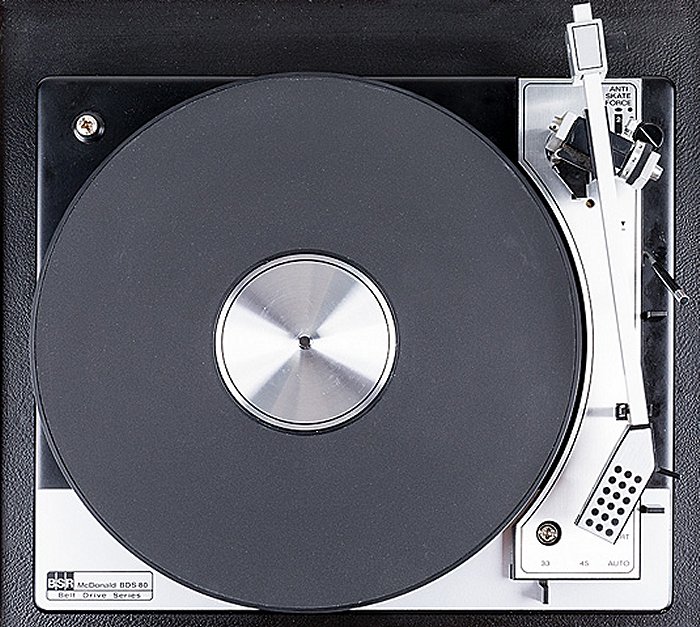
A BSR BDS80 turntable. |
|
The production of
turntables ended on the 25th June, 1984, but
began again two years later when Schneider in
Germany ordered around 60,000 linear turntables.
Production however was soon handed to a Chinese
company. In June 1989, BSR International plc
became Astec (BSR) plc and the BSR name was sold
to DAK, a manufacturer based in Los Angeles. The
company ceased to trade and the Wollaston site
was sold to Sunrise Medical Equipment. It was a
sad end to a once successful British Company
that had been defeated by cheap imports from the
far east.
|
 |
Return to the
previous page |
|